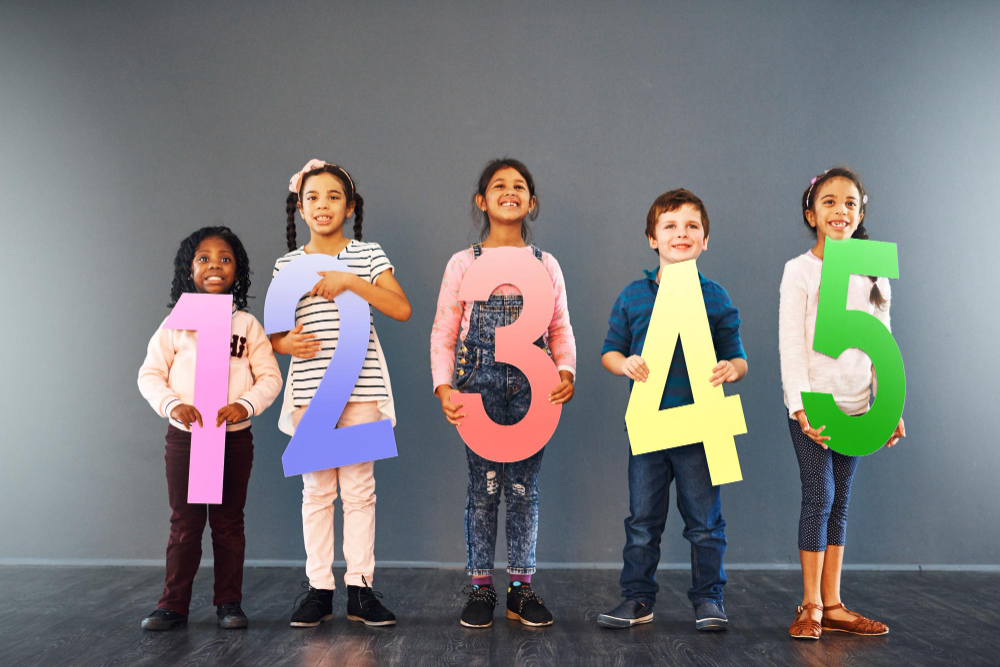When it comes to teach English For the little ones at home, many doubts arise. Where to start? Because of the colors? The objects? The numbers in English? In this article we reveal how you can start the learning of children if you want to start at home.
What is the first thing children should learn in English?
Learning English at an early age contributes to improve fluency and pronunciation of the little ones, but also to develop their cognitive abilities and concentration. Furthermore, learning a second language has many positive effects in terms of creativity it means. The ideal is for the little ones to start learning English from three and six years old, since it is the age at which they have a greater brain plasticity.
From these ages onwards, children can start at home and then go to school. lessons, carry out linguistic immersions. Is it good to start with numbers in English?

Why learn numbers in English?
When it comes to learning for the little ones, numbers in englishs play a fundamental role. They are the basis that, in the long run, will allow us to carry out and understand the mathematical operations in the language. But the numbers are also important for everyday and they are even included in any conversation to talk about objects and people.
The numbers in English are one of the first things that is taught to children, but it is not the only one. Generally, they are accompanied by others simple and easy vocabularies, but just as useful. For example, the colors, body parts, furniture, clothes, days of the week, months, etc. However, keep in mind that the English numbers serve as a basis for being able to count and refer to objects and dates.
What numbers in English to teach first?
At an early age, children learn counting from 1 to 10, but not only when it comes to English numbers. Even in Spanish, little ones learn these numbers first and, later, they expand the count until the 20th. Starting with 20 they are composite numbers: 21 is twenty one, 22 is twenty two, etc. That is why it is essential that first numbers are mastered in English from 1 to 10 and then continue until 20 and successive numbers.
Because? Because as we already mentioned, starting on the 20th the structure of numbers It repeats itself over and over and only changes when you get to the next one. ten: 30 (thirty), 40 (forty), 50 (fifty)…until you reach 100 (one hundred).
On the other hand, once the little ones begin to master numbers in English, then the ordinal numbers. These are also essential to speak correctly and maintain a fluid conversation. Ordinal numbers, as their name indicates, are used to designate the order of things and indicate the position they occupy.
Unlike the Cardinal numbers (one, two, three, four, etc.), ordinals are always accompanied by some suffixes: -st, -nd-, -rd and -th. This is what the ordinal numbers would be first (first), second (second), third (third), fourth (room), fifth (fifth) and from here you can continue counting to infinity.
How to learn to count in English?
The vast majority of children learn basic memory numbers and they are able to recite them on the fly. However, it is very important that learn to use them Correctly. How to teach numbers to little ones? Everything will depend on your age! Keep in mind that when children learn to read and write, then it will be much easier for them to understand the structure of the word.

For example, all numbers in English, from 13 to 19, have the suffix -teen. Furthermore, as we have already pointed out, ordinal numbers have a different composition. We present some activities that you can do with your little ones to teach them numbers in English.
Count objects
The easiest way to teach numbers is counting objects. It is a very conventional and effective method. The most advisable thing is use objects that are effective for little ones, such as stuffed animals, toys and even pencils. Depending on the child's age, The most advisable thing is to start from 1 to 10 and, once you have mastered the first ten, continue until 20.
attractive images
A very activity playful, especially recommended for younger children, is to associate images with concepts. This activity consists of associate the image with a word, in this case, the numbers in English. For example, teach a very colorful and eye-catching card with the number 1 for your little one to say "one". And so on.
As your English vocabulary increases, you can include Animal figures or other objects. For example, "two dogs", "three cars", etc. The idea is that these sheets are visually attractive for the children.
Learn numbers in English by singing!
A very easy and fun way to learn numbers in English is through music. This is a technique used for many years in English classes, but today, thanks to the Internet, it is possible to find different educational rhythms and videos. You can play the song on the way to school or while you are preparing dinner.
Use applications
Although it is important limit children's screen time, you can spend 10-15 minutes a day on one teaching app of numbers in English. These apps can be downloaded on tablets and mobile phones, but can also be used on computers. Apps are a good alternative because they include animated characters, songs, and fun games.
Play with numbers
Learning English doesn't have to be boring for little ones. Enter the numbers through different games that are attractive. You can start with the traditional game of hiding place, counting from 1 to 10 in English or create your own games for children to learn. They include card games, memory games, number soups, etc.
It is also possible to include the numbers in the day to day in everyday activities as sort out toys or go to the supermarket.
¿De cuánta utilidad te ha parecido este contenido?
¡Haz clic en una estrella para puntuarlo!
Promedio de puntuación 5 / 5. Recuento de votos: 296
Hasta ahora, ¡no hay votos!. Sé el primero en puntuar este contenido.


